1888 Democratic National Convention
The 1888 Democratic National Convention was a nominating convention held June 5 to 7, 1888, in the St. Louis Exposition and Music Hall in St. Louis, Missouri. It nominated President Grover Cleveland for reelection and former Senator Allen G. Thurman of Ohio for vice president.
| 1888 presidential election | |
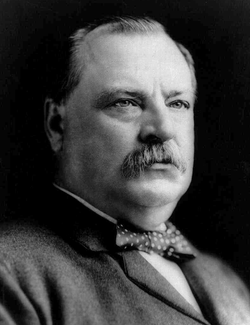 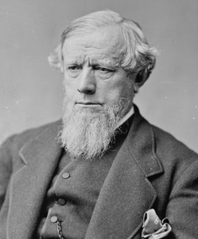 Nominees Cleveland and Thurman | |
| Convention | |
|---|---|
| Date(s) | June 5–7, 1888 |
| City | St. Louis, Missouri |
| Venue | Exposition Building |
| Candidates | |
| Presidential nominee | Grover Cleveland of New York |
| Vice presidential nominee | Allen G. Thurman of Ohio |
St. Louis won the convention after a presentation in February 1888.
Proceedings
Stephen M. White served as temporary chairman and Patrick A. Collins served as the convention's permanent president.[1]
Platform
The Democratic platform largely confined itself to a defense of the Cleveland administration, supporting reduction in the tariff and taxes generally as well as statehood for the western territories.
Presidential nomination
Presidential candidates
President Cleveland was renominated by acclamation. An event few could directly remember, as the last time such a thing happened was 48 years (1840) previous. Presidents Franklin Pierce and Andrew Johnson lost the nomination in 1852 and 1868 respectively, and Presidents James K. Polk and James Buchanan refused to run for a second term.
Vice Presidential nomination
Vice Presidential candidates
 Former Senator Allen G. Thurman of Ohio
Former Senator Allen G. Thurman of Ohio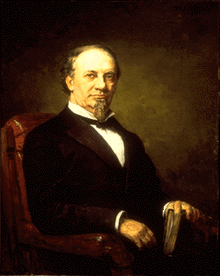
 U.S. Commissioner of Pensions John C. Black of Illinois
U.S. Commissioner of Pensions John C. Black of Illinois
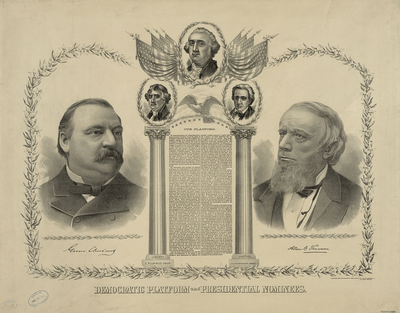
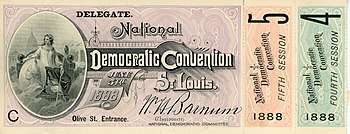
After Cleveland was renominated, Democrats had to choose a replacement for Thomas A. Hendricks. Hendricks ran unsuccessfully as the Democratic nominee for vice-president in 1876, but won the office when he ran again with Cleveland in 1884. Hendricks served as vice-president for only eight months before he died in office on November 25, 1885.
Three names were placed in nomination: Allen G. Thurman, Isaac P. Gray, and John C. Black. Former Senator Thurman of Ohio was nominated for vice-president over Indiana Governor Gray, his nearest rival, and John C. Black, who trailed behind. Gray lost the nomination to Thurman primarily because his enemies brought up his actions while a Republican.[2]
| Vice Presidential Ballot | ||
| 1st | Acclamation | |
|---|---|---|
| Allen G. Thurman | 684 | 822 |
| Isaac P. Gray | 101 | |
| John C. Black | 36 | |
| Blank | 1 | |

1st Vice Presidential Ballot
See also
- History of the United States Democratic Party
- Grover Cleveland Presidential campaign, 1888
- 1888 United States presidential election
- U.S. presidential nomination convention
- List of Democratic National Conventions
- 1888 Republican National Convention
References
- Our Presidents and How We Make Them by Alexander K. McClure Ayer Co Pub (February 1988) ISBN 0-8369-5532-3
- Jacob Piatt Dunn, George William Harrison Kemper, Indiana and Indianans (p. 724).
Further reading
- Nevins, Allan. Grover Cleveland: A Study in Courage (1932) online.
Primary sources
- Chester, Edward W A guide to political platforms (1977) pp 115–120 online
External links
- Democratic Party Platform of 1888 at The American Presidency Project
- Official Proceedings of the National Democratic Convention, Held in St. Louis, Mo., June 5th, 6th and 7th, 1888
| Preceded by 1884 Chicago, Illinois |
Democratic National Conventions | Succeeded by 1892 Chicago, Illinois |